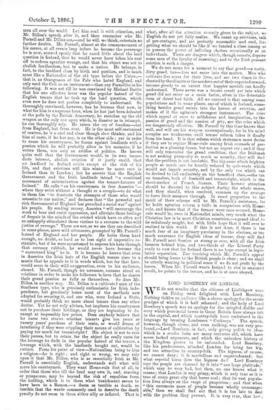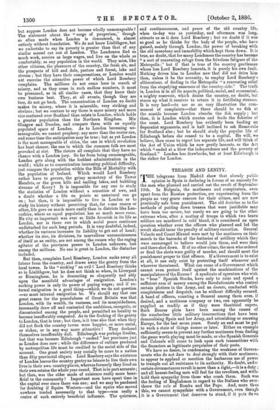LORD ROSEBERY ON LONDON.
WE do not wonder that the citizens of Linlithgow were on Friday week delighted with Lord Rosebery. Nothing tickles an audience like a clever apology for the secret grudges of which it is half ashamed ; and the body of Lord Rosebery's speech was an apology for the mingled dislike and envy which provincial towns in Great Britain have always felt to the capital, and which country-folk have embalmed in the language by terming Londoners " Cockneys." The speech, however, though clever, and even striking, was not very pro- found,—Lerd Rosebery, in fact, only giving polish to ideas which in a cruder form are many centuries old, which have never lacked exponents, and which the unbroken history of the Kingdom proves to be unfounded. Lord Rosebery, like his predecessors, attacked London for being too big, and too attractive to country-folk. The bigness, of course, we cannot deny ; it is marvellous and unprecedented ; but what especial harm does the bigness do ? Lord Rosebery says the people are churned by it into " one huge platitude," which may be very bad, but then, no one knows what it means ; that London is very grimy, which is only true as it is true of every great city that burns coal ; that its vast popula- tion lives always on the verge of pauperism ; and that when "this enormous mass of people become wholly unmanage- able," then we shall find out that it is too late to deal with the problem they present. It is very true, that last
but suppose London does not become wholly unmanageable ? The statement about the " verge of pauperism," though so often made when London is denounced, is almost entirely without foundation. We do not know Linlithgow, but we undertake to say its poverty is greater than that of any similar morsel cut out of London. The Londoners find as much work, receive as large wages, and live on the whole as comfortably, as any population in the world. They miss, like other citizens, the pleasures of the country, the fresh air, and the prospects of hill and dale, pasture and forest, lake and stream ; but they have their compensations, or London would not exercise the attractive power of which Lord Rosebery complains. The millions do not come here in search of misery, and as they come in such endless numbers, it must be presumed, as in all similar cases, that they know their own business best. They, at all events, though they are free, do not go back. The concentration of London no doubt makes its misery, where it is miserable, very striking and obvious ; but we venture to say there is more misery and more vice scattered over Scotland than exists in London, which holds a greater population than the Northern Kingdom. Mix Glasgow and Dundee, and compare them with an equally populated space of London. As to London becoming un- manageable, we cannot prophesy, any more than the orator can, and some time the anticipation may be true ; but as yet London is the most manageable of cities, the one in which revolution has least chance, the one in which the common folk are most provoked at riot. The rioters all complain that they have no chance with a London jury. So far from being unmanageable, London gets along with the feeblest administration in the world ; while as to concentration increasing political difficulty, just compare the population within the Bills of Mortality with the population of Ireland. Which would Lord Rosebery rather have to govern, the grimy monotony of the Tower Hamlets, or the green hills and smiling lakes, and bubbling streams of Kerry ? It is impossible for any one to study the statistics of London without a sensation of awe, and a doubt whether a life on points so unnatural can go on ; but then, it is impossible to live in London or to study its history without perceiving that, for same reason or other, life goes on much more easily than in districts like Lan- cashire, where an equal population has so much more room. No city so important was ever so little feverish in its life as London, nor is there one in which social peace continues undisturbed for such long periods. It is very doubtful, indeed, whether its vastness increases its liability to get out of hand; whether its size, its divisions, its marvellous unconsciousness of itself as an entity, are not among the causes why the raging agitator of the provinces passes in London unknown, lost among the millions. No one is great in London, the disturber included.
But then, complains Lord Rosebery, London sucks away all labour from the country, and draws away the gentry from the local towns. Is the " sucking " an evil ? Lord Rosebery thinks so in Linlithgow, but he does not think so when, in Liverpool or Birmingham, he is descanting so eloquently and ably upon the manifold advantages of emigration. London's sucking power is only its power of paying wages ; and if ex- ternal emigration is a good thing—which we do not question —so must internal emigration be. We should say that one great reason for the peacefulness of Great Britain was that London, with its wealth, its vastness, and its manysidedness, incessantly drew off and contented the ambitious, energetic, or discontented among the people, and permitted no locality to become insufferably congested. As to the flocking of the gentry to London, that is true ; but then, is it true also that when they did not flock the country towns were happier, or more social, or richer, or in any way more attractive ? They declared themselves insufferably dull. Edinburgh was perhaps livelier, but that was because Edinburgh " sucked " her provinces just as London does now ; while the difference of culture produced by metropolitan life must be credited to the social side of the account. One great society may socially be more to a nation than fifty provincial cliques. Lord Rosebery says the existence of London leaves the country gentry no leisure to live their own lives in their own country places, whereas formerly they lived on their own estates the whole year round. That is in part accurate; but then, was the older mode of existence really more bene- ficial to the community ? Important men have spent time in the capital ever since there was one; and we may be pardoned for doubting if Squire Western—and the squire who moved nowhere tended necessarily to that type—was really a centre of such entirely beneficial influence. The quietness,
and continuousness, and peace of the old country life, when to-day was as yesterday, and afternoon was long, attracts us as it does Lord Rosebery ; but we doubt if it was so good as he thinks for the body of the people, who have gained, mainly through London, the power of breaking with the old monotony and immobility which kept them down. It is true, no doubt, that for many Londoners the country has become " a sort of renovating refuge from the frivolous fatigues of the Metropolis ;" but if that is true of the country gentleman whose loss Lord Rosebery laments, it is purely his own fault. Nothing drives him to London now that did not drive him then, unless it be the necessity, to employ Lord Rosebery's alliterations, of finding in the Metropolis " a renovating relief from the stupefying sameness of the country-side." The truth is, London is in all its aspects, political, social, and economical, a mighty reservoir, which drains the country, no doubt, but stores up what it receives to return it in fertilising streams. It is very hard—to use as an easy illustration the com- monest of complaints—that there should be no fish at the seaside because London absorbs the fish supply ; but then, it is London which creates and feeds the fisheries of the coast. Lord Rosebery has evidently been feeding on Separatist arguments, and is half inclined to ask Home-rule for Scotland also ; but he should study the popular life of Edinburgh before she ceased to be a capital. He will, we believe, then cease to regret her separate life, and will think of the Act of Union which he now gently laments, as the Act which "ended at a blow the independence and the poverty of Scotland." London has drawbacks, but at least Edinburgh is the richer for London.



































 Previous page
Previous page